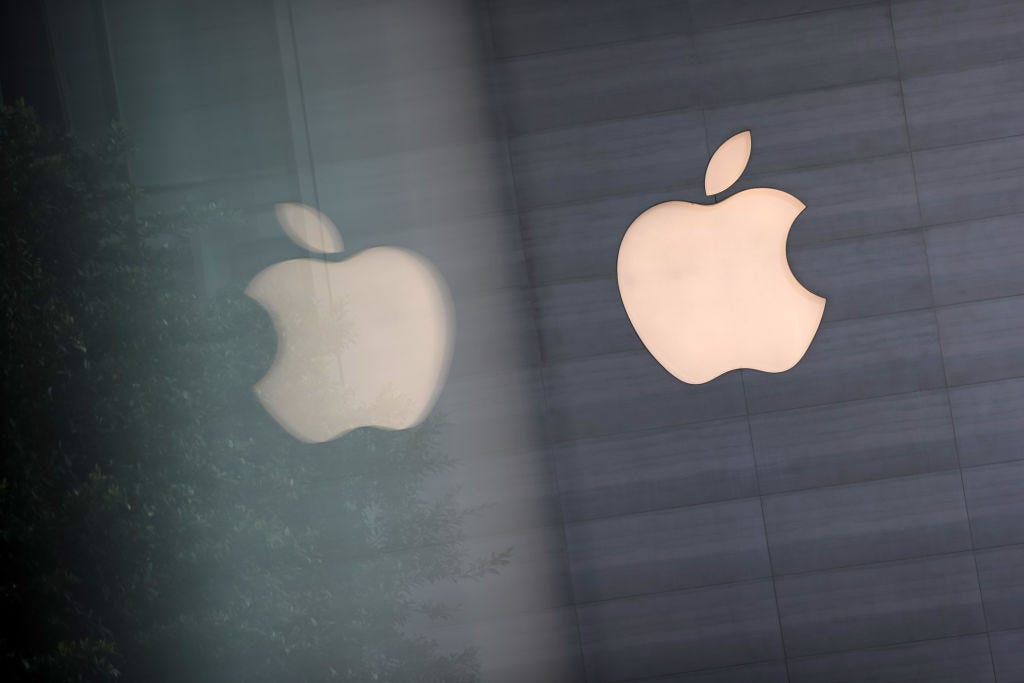Bad Apple
Apple does not want the public to think of the company only as a profit-obsessed manufacturer of iPhones, AirPods, and MacBooks. Rather, Apple would like to be viewed as a responsible corporate citizen that understands the urgency of action on climate change. In 2013, Apple hired former EPA Administrator Lisa Jackson to head up its "environmental responsibility efforts."
Jackson, now Apple's VP for Environment, Policy, and Social Initiatives, released a statement asserting that "the urgent threat of climate change is a key priority" for the company. Jackson called on Congress and the Biden administration to take "urgent action" to pass "climate policies that quickly decarbonize our electric grid." Specifically, Jackson said Apple supports "the enactment of a Clean Energy Standard (CES) that would decarbonize the power sector by 2035."
Jackson released this statement because Congress has an opportunity to enact such a standard this year as part of a broader reconciliation package pending before the House and Senate. The proposal would allocate about $150 billion to incentivize utilities to shift to cleaner sources of power. (Utilities that fail to take action could face fines.)
This policy is essential because reducing carbon emissions from electricity production is the lynchpin of an effective climate policy. You can trade in your gas-guzzler for a Tesla but if the electric grid is still powered by coal plants, it won't do much good. The Clean Energy Standard is the centerpiece of the Biden administration's effort to reduce overall carbon emissions to 50% of 2005 levels by 2030.
The goal of the Clean Energy Standard in the reconciliation package would be to reduce carbon emissions from the power sector by 80% by 2030 and 100% by 2035. It's the precise policy that Jackson said Apple supported in her statement.
In August, Apple also joined a number of corporations in sending a letter to Congress calling on them to pass a Clean Energy Standard:
Dear Member of Congress,
We, the undersigned businesses, have a major presence in the U.S. and significant investments in the generation and purchase of U.S. electric power. We urge you to support a Federal Clean Electricity Standard that will transform the U.S. electric power grid to 100% clean energy by 2035. A federal clean electricity standard will power America’s businesses and homes with affordable, job-creating clean energy and drive energy efficiency improvements for a healthier and prosperous future…
By acting now to enact a federal clean electricity standard, Congress and the President can spur a robust economic recovery, create millions of good-paying jobs, and build the infrastructure necessary for a strong, more equitable, and more inclusive American economy for the next century.
You can count on our support.
Given this stance, you might be surprised that Apple is part of a "massive lobbying blitz" to kill the reconciliation package and its Clean Energy Standard.
Apple CEO Tim Cook sits on the board of the Business Roundtable, a group comprised of influential CEOs. Jessica Boulanger, a spokesperson for the group, told the Washington Post that the Business Roundtable was involved in "a significant, multifaceted campaign" to defeat the reconciliation package and will "continue to ramp up our efforts in the coming weeks."
Last week, the Business Roundtable began running paid ads on Facebook opposing the reconciliation package. One ad called the legislation, which contains the Clean Energy Standard, "bad for Montana workers and the economy."
The ads focus on the funding mechanism for the package, which includes increasing the corporate tax rate by a few percentage points — from 21% to 26.5%. The rate would still be far lower than the 35% corporate tax rate in place prior to the 2017 tax cuts. In 2020, Apple had $67 billion in profits and an effective tax rate of 14.4%.
The Business Roundtable is also criticizing the spending portions of the reconciliation bill, which includes the Clean Energy Standard. In an August 24 statement, the group said it "would not only saddle Americans with a substantial debt burden but also undermine the competitiveness of the U.S. economy, businesses and workers." In another statement released September 13, the Business Roundtable blasted the bill in even harsher terms, blasting the package as "a step backward for the U.S. economy that will harm all Americans."
Apple and Lisa Jackson did not respond to Popular Information's request for comment.
Netflix loses the plot
Apple is not alone. Other prominent corporations are stressing the importance of the reconciliation bill's climate provisions, while also participating in an effort to kill the bill.
Netflix has spoken up in support of the climate provisions in the reconciliation bill. On September 20, the company published a statement on LinkedIn in support of the bill's Clean Energy Standard and emphasized the need for Congress to act quickly.
The Clean Electricity Performance Program is a well-designed “carrot-forward” approach that financially rewards utilities for cleaning up their energy supply...
The urgency for climate policy could not be clearer. The latest IPCC report warns of the dire consequences of continued warming. Extreme weather events this summer in the United States and around the world illustrate the growing human and economic costs of inaction. These impacts are already falling hardest on low-income communities and communities of color, many of whom are our members. So the impact of the U.S. Congress’s decisions in the coming weeks cannot be overstated.
Netflix also signed the August letter supporting the same provisions.
Yet, Netflix’s Chief Content Officer and co-CEO, Ted Sarandos, is a member of the Business Roundtable, which is running advertisements to defeat the legislation. Netflix did not return a request for comment.
General Motors' climate push breaks down
The reconciliation bill also offers incentives for those who buy electric vehicles, including a $7,500 tax credit for purchasing an electric vehicle. This is favored by General Motors, who announced an ambitious climate pledge in January. The plan includes only producing cars with zero tailpipe emissions by 2035, sourcing 100 percent renewable energy by 2035, and becoming 100 percent carbon neutral by 2040.
“General Motors is joining governments and companies around the globe working to establish a safer, greener and better world,” GM Chairman and CEO Mary Barra said in a statement. “We encourage others to follow suit and make a significant impact on our industry and on the economy as a whole.”
GM signed the letter to Congress in August in support of the Clean Energy Standard.
But GM’s CEO Mary Barra sits on the board of directors for Business Roundtable which has made the decision to lobby against the reconciliation bill. GM did not respond to Popular Information’s request for comment.
Other companies that signed the letter urging the government to implement a Clean Energy Standard, but have executives in the Business Roundtable include: 3M, Ball Corporation, SAP America, Workday, Ford, Exelon, Johnson Controls, Gap, HP Inc., Levi’s, PayPal and Salesforce. Johnson Controls’ and PayPal’s CEOs both sit on the Roundtable’s Board of Directors.
Patagonia says the climate is more important than lower taxes
Many companies talk about their commitment to climate change but are prioritizing their bottom line. Patagonia, however, is taking a different approach.
“Patagonia strongly urges swift passage of the once-in-a-generation opportunity to avoid a worsening climate crisis and to give working families the support they deserve now,” the company said in the statement. “To pay for this critical legislation, Patagonia is willing to pay a higher corporate tax rate and we urge Congress to also consider ending subsidies for the extractive industries.”
230 smaller companies have taken a similar stance through a statement released by the American Sustainable Business Council.







Apple CEO Tim Cook sits on the board of the Business Roundtable....
But they're such a cool company! 🙄
Cheers for Patagonia as the only company standing up for its customers!
Apple is notoriously hypocritical about environmental matters. They will do whatever works best for marketing purposes, regardless of the impact. Example: Recyclable packaging implies that they care about the environment, but every time they update a product or launch a new one, they make no effort to make its size and features conform to prior versions. Consequently, the world is cluttered with a glut of useless cases and peripherals that end up in landfills. If Apple truly cared about the environment, their design priorities would be different.